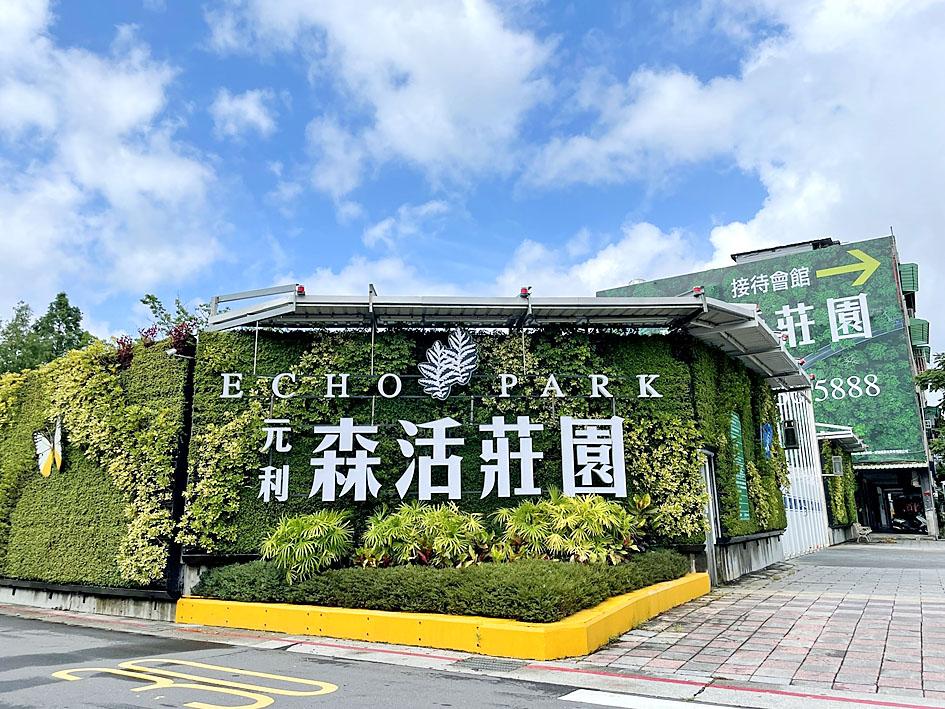Presale housing projects are expected to soar 64.5 percent year-on-year to NT$269.03 billion (US$9.71 billion) in northern Taiwan in the autumn sales season from Sept. 28 through next month, as local cases of COVID-19 and social distancing rules prompted developers to push back launches, the Chinese-language My Housing Monthly said on Thursday last week.
The volume, which would be the largest in history, is projected because a level 3 COVID-19 alert from May to July virtually froze consumer activity, My Housing Monthly research manager Ho Shih-chang (何世昌) said.
Developers and builders regained some confidence after locally transmitted infections dropped to low single-digit numbers, Ho said, adding that a relatively low base last year was also a factor.

Photo: Hsu Yi-ping, Taipei Times
Taipei and New Taipei City account for NT$84.7 billion, or 31.48 percent, with apartments featuring low entry requirements dominating the market in New Taipei City, the magazine said.
New Taipei City’s Banciao (板橋), Sindian (新店), Tamsui (淡水) and Sinjhuang (新莊) districts are each expected to have new residential projects that generate NT$10 billion in sales, it said, adding that the apartments generally have two or three bedrooms to attract people with real demand, especially first-time home buyers.
Taipei has also reported an increase in new apartments of less than 30 ping (99m2), as few people want large homes, Ho said.
New housing projects in Taoyuan total more than NT$50 billion, mostly concentrated in Jhongli (中壢) and Cingpu (青埔) districts with asking prices approaching NT$500,000 per ping, the magazine said.
The market in Hsinchu is quiet, with new projects of a little more than NT$10 billion as developers adopt a low-key approach that might lead to a shortage of homes, it said.
Yilan County reported the lowest value for expected new housing projects in northern Taiwan at NT$2.7 billion, it said.
Major developers such as the Yuanlih Group (元利建設), Chong Hong Construction Co (長虹建設), Hong Pu Real Estate Development Co (宏普建設), Kindom Construction Corp (冠德建設) and Cathay Real Estate Development Co (國泰建設) are selling projects, a sign that the market might be emerging from a slowdown, despite the spread of the Delta variant of SARS-CoV-2, Ho said.

UNCERTAINTY: Innolux activated a stringent supply chain management mechanism, as it did during the COVID-19 pandemic, to ensure optimal inventory levels for customers Flat-panel display makers AUO Corp (友達) and Innolux Corp (群創) yesterday said that about 12 to 20 percent of their display business is at risk of potential US tariffs and that they would relocate production or shipment destinations to mitigate the levies’ effects. US tariffs would have a direct impact of US$200 million on AUO’s revenue, company chairman Paul Peng (彭雙浪) told reporters on the sidelines of the Touch Taiwan trade show in Taipei yesterday. That would make up about 12 percent of the company’s overall revenue. To cope with the tariff uncertainty, AUO plans to allocate its production to manufacturing facilities in

TAKING STOCK: A Taiwanese cookware firm in Vietnam urged customers to assess inventory or place orders early so shipments can reach the US while tariffs are paused Taiwanese businesses in Vietnam are exploring alternatives after the White House imposed a 46 percent import duty on Vietnamese goods, following US President Donald Trump’s announcement of “reciprocal” tariffs on the US’ trading partners. Lo Shih-liang (羅世良), chairman of Brico Industry Co (裕茂工業), a Taiwanese company that manufactures cast iron cookware and stove components in Vietnam, said that more than 40 percent of his business was tied to the US market, describing the constant US policy shifts as an emotional roller coaster. “I work during the day and stay up all night watching the news. I’ve been following US news until 3am

COLLABORATION: Given Taiwan’s key position in global supply chains, the US firm is discussing strategies with local partners and clients to deal with global uncertainties Advanced Micro Devices Inc (AMD) yesterday said it is meeting with local ecosystem partners, including Taiwan Semiconductor Manufacturing Co (TSMC, 台積電), to discuss strategies, including long-term manufacturing, to navigate uncertainties such as US tariffs, as Taiwan occupies an important position in global supply chains. AMD chief executive officer Lisa Su (蘇姿丰) told reporters that Taiwan is an important part of the chip designer’s ecosystem and she is discussing with partners and customers in Taiwan to forge strong collaborations on different areas during this critical period. AMD has just become the first artificial-intelligence (AI) server chip customer of TSMC to utilize its advanced

Six years ago, LVMH’s billionaire CEO Bernard Arnault and US President Donald Trump cut the blue ribbon on a factory in rural Texas that would make designer handbags for Louis Vuitton, one of the world’s best-known luxury brands. However, since the high-profile opening, the factory has faced a host of problems limiting production, 11 former Louis Vuitton employees said. The site has consistently ranked among the worst-performing for Louis Vuitton globally, “significantly” underperforming other facilities, said three former Louis Vuitton workers and a senior industry source, who cited internal rankings shared with staff. The plant’s problems — which have not